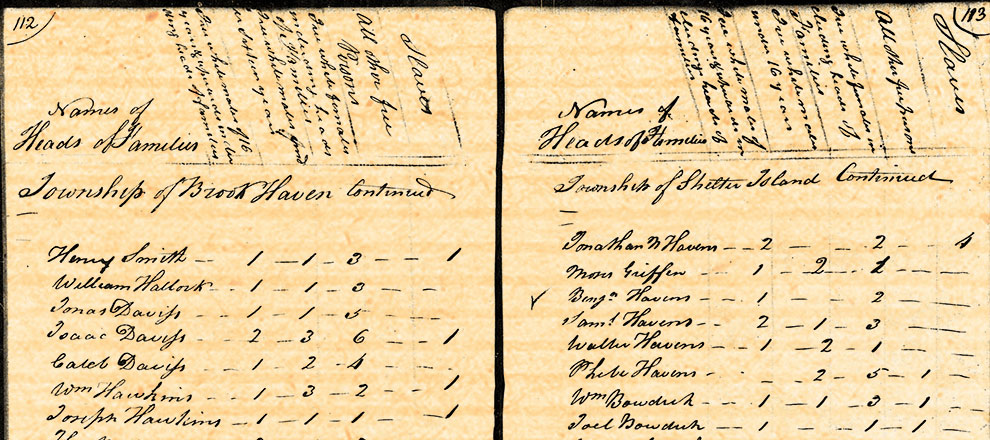
Credit: National Archives
Long Island in 1790 was populated by about 1 percent of the people who live here today; with a relatively equal number of men and women and about 2,000 slaves.
That’s the picture painted by America’s first Census, collected after President George Washington signed the 1790 Census Act so the government could learn “the aggregate amount of each description of persons” to be able to form a representative government, according to the U.S. Census Bureau.
Aug. 2, 1790, was the official “Census Day” and the process was to be led by then-Secretary of State Thomas Jefferson.
In honor of the 227th anniversary of America’s first Census, here’s a look at Long Island’s population in 1790.
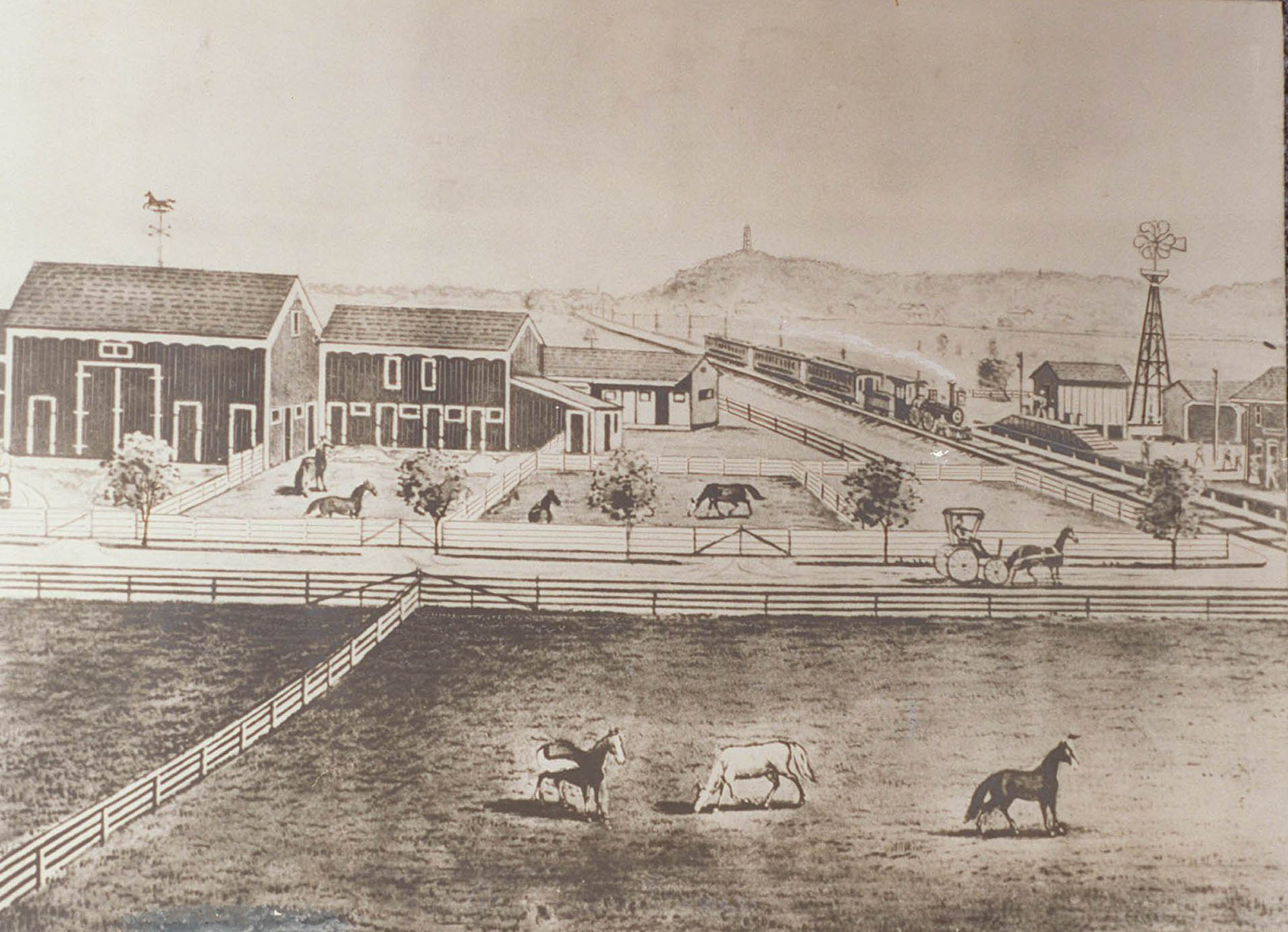
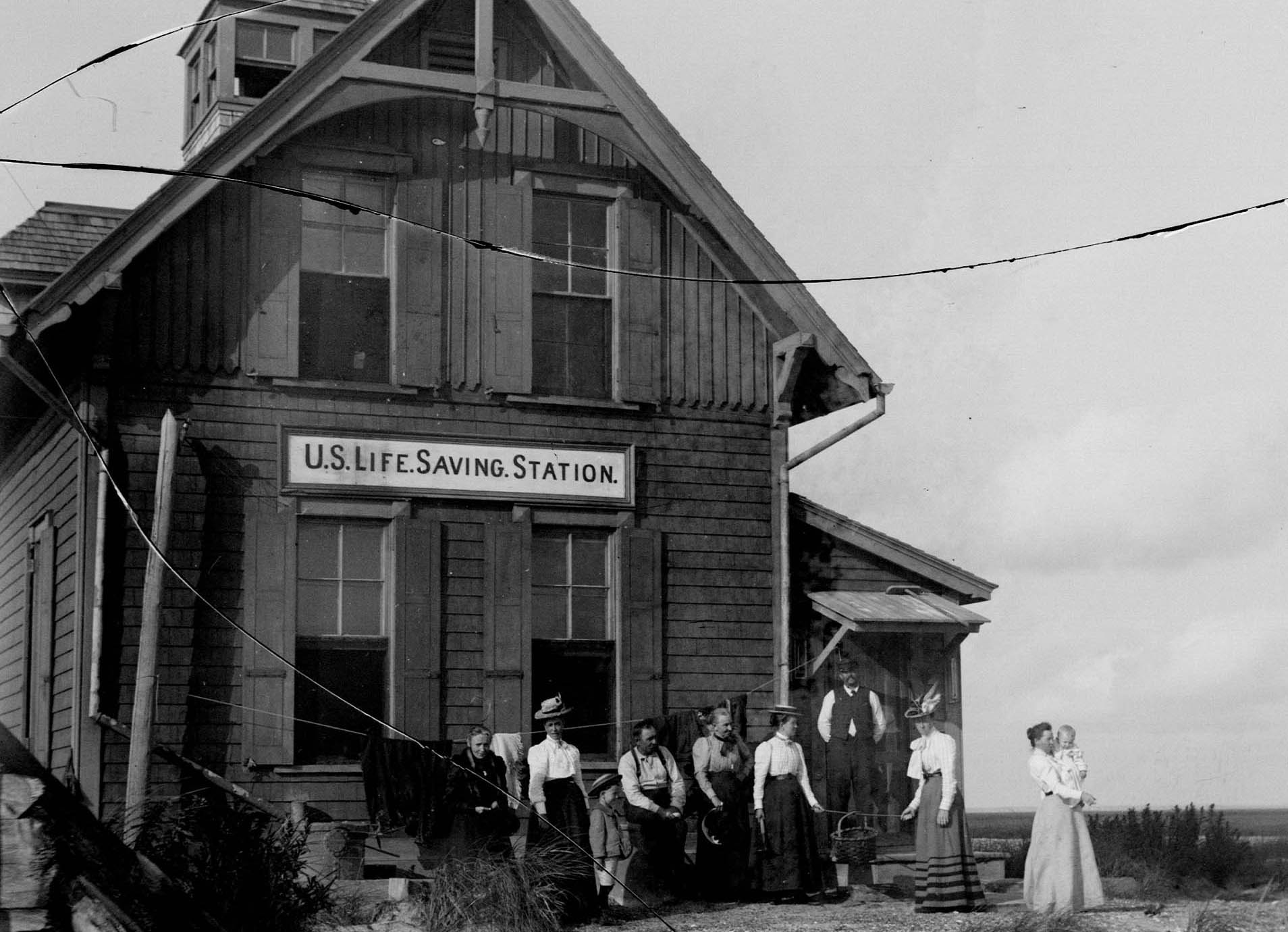
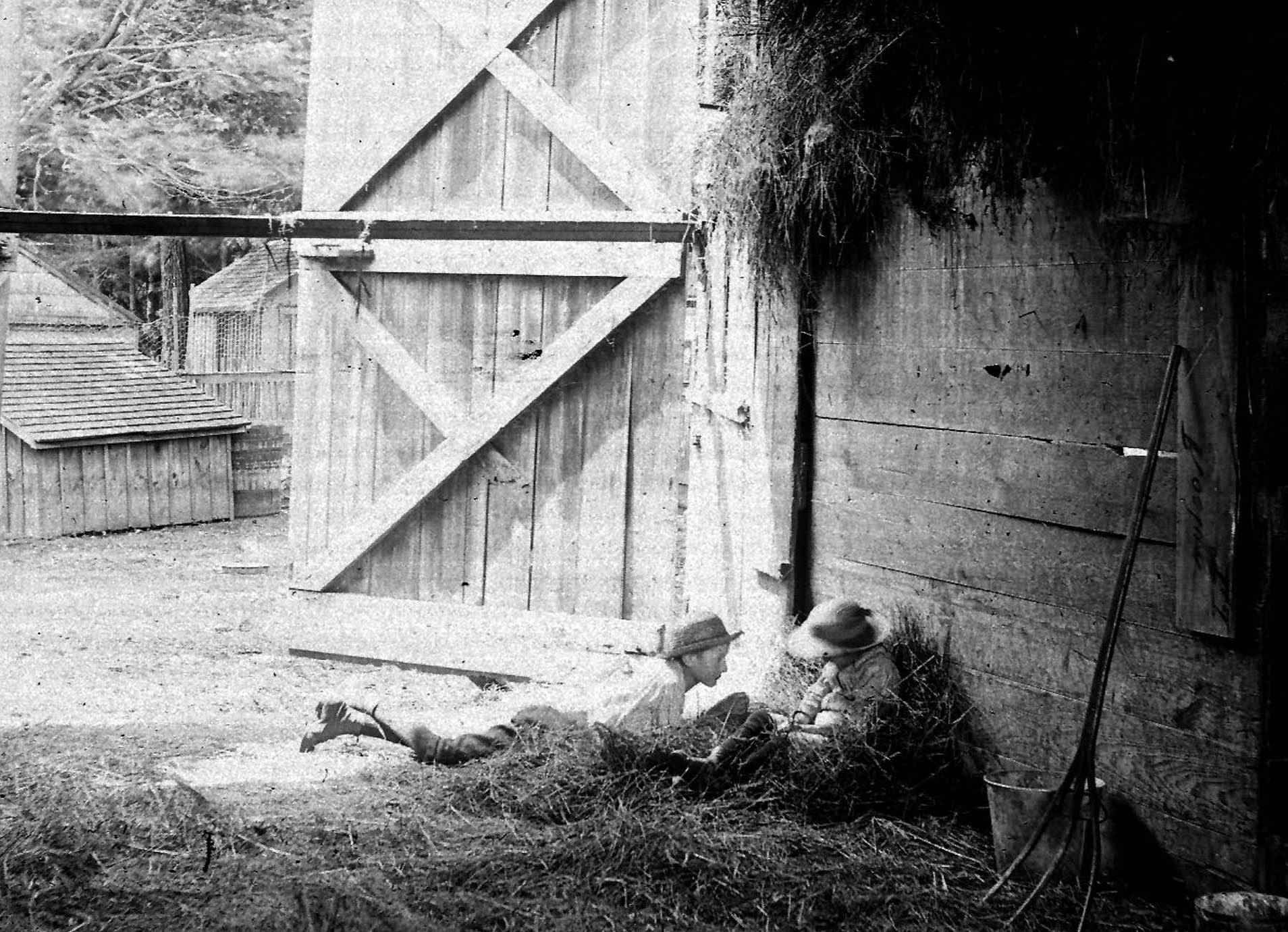
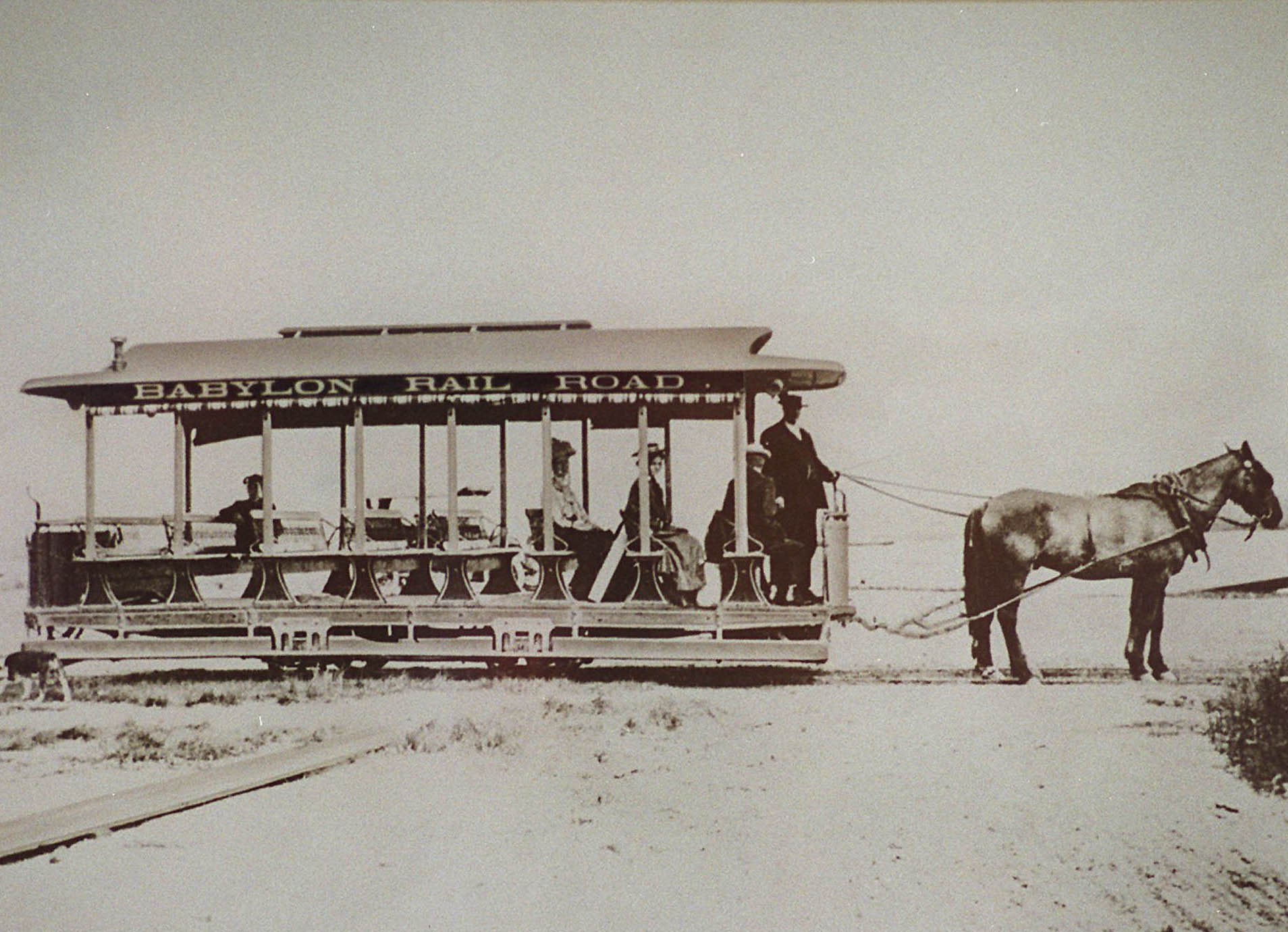
Scenes from Long Island in the 1800s. Photo credits from top left, clockwise: East Williston Village Historian; Nassau County Museum Collection; Nassau County Museum; Unknown.

Boys in a barn in Old Westbury circa 1890.
The geography of 1790
In 1790, Brooklyn and Queens were still considered part of Long Island. Nassau County did not yet officially exist; the towns of North Hempstead, Oyster Bay and South Hempstead were part of Queens County. Suffolk County was made up of eight towns; what was the Town of Huntington then also included the current Town of Babylon, and what was the Town of Southold then included what is now the Town of Riverhead.
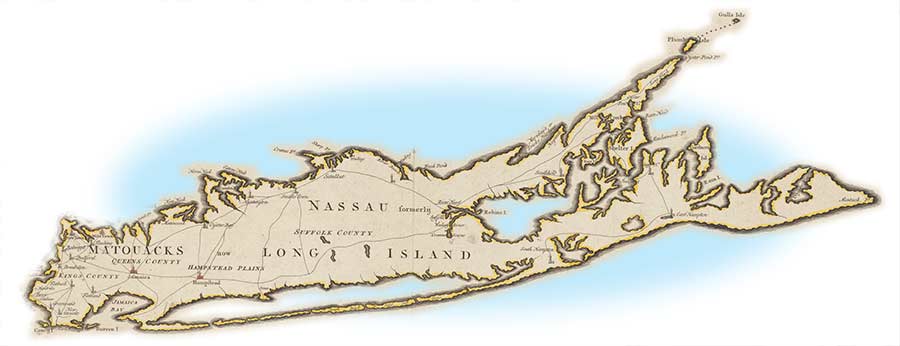
Long Island map from approximately 1780. Credit: New York Public Library Digital Collections
The numbers highlighted here, unless otherwise noted, represent statistics from Suffolk County and the three towns that would become Nassau County — so these are the 1790 totals for the area making up modern day Long Island.
The findings
The Census sought information on just five categories:
- Free white males over 16 (for possible industrial and military potential)
- Free white males under 16
- Free white females (including heads of households)
- All other free persons (including free blacks and Indians)
- Slaves.
In 1790, Long Island’s total population was 27,061. By comparison, the 2010 census estimate placed LI’s population at about 3 million — just under the population of the entire United States in 1790.
Broken down by county, the three areas that currently make up Nassau County had 10,621 people, and Suffolk County had 16,440.
Nassau’s most populated area was Oyster Bay, with 4,097 people, and its least-populated area was North Hempstead, with 2,696. Suffolk’s most populated area was Southampton, with 3,408 people, and its least-populated area was Shelter Island, with just 201 people.
Here are the islandwide totals for the six categories in the Census:
27,061
Total population
6,168
Free white males older than 16
5,260
Free white males younger than 16
11,627
Free white females
1,694
All other free persons
2,312
Slaves
Each white family in Suffolk County had an average of 5.1 members; in Queens County (including modern-day Nassau), there were 5.7 members.
Roughly 17.1 percent of Suffolk households reported holding slaves; in Queens County that number was 34.6 percent, and in Kings County (Brooklyn), the number was 61.1 percent.
Slaves on LI
The Census found that New York was the largest slave-holding state in the north, with 21,324. In comparison, the largest slave-holding state in the south was Virginia, with 292,627, more than 13 times as many.
There were 2,312 slaves on Long Island, roughly 8.5 percent of the total population.
According to the Census, the largest slaveholder in Suffolk County was William Floyd of Mastic, who had 14, and the largest slaveholder in what would become Nassau County was Samuel Martin of South Hempstead, who had 17. 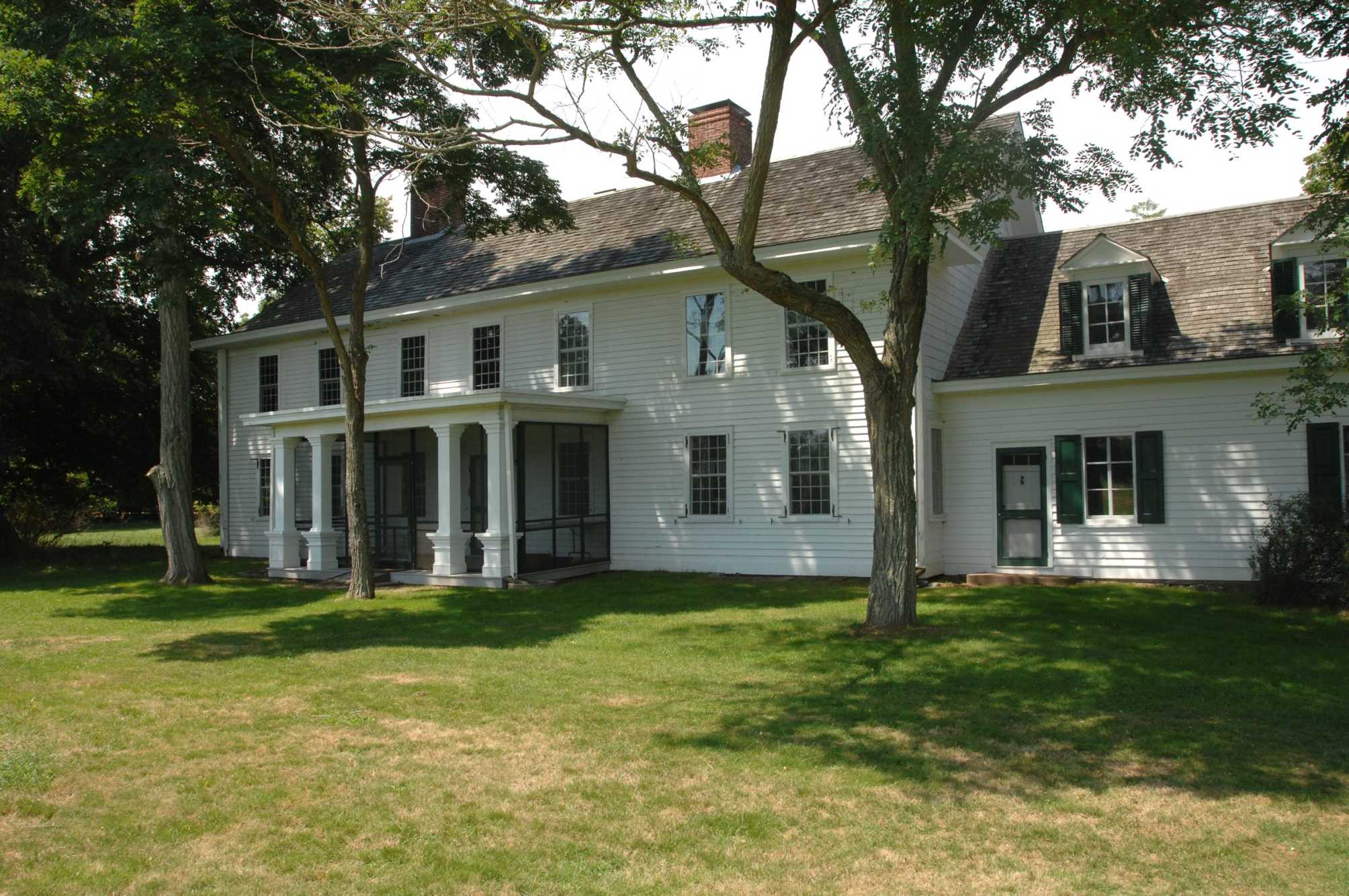
The William Floyd Estate in Mastic Beach. Credit: Newsday/ Michael E. Ach
Ethnicity
Though the Census solicited no information about ethnic background, the Inter-University Consortium for Political and Social Research analyzed the surnames of the white population in 1790 to create a likely ethnic breakdown of national backgrounds. (Their analysis is for Suffolk County and all of Queens County — all of modern-day Nassau County and all of modern-day Queens).
They found that nearly three quarters of the population — 73.2 percent — was likely either English or Welsh. The next biggest group was slaves, at 10.5 percent, and 7.4 percent of people were Dutch.
Heads of household
Scroll through and zoom in on the full Census document below to see which last names populated Long Island in 1790.
Check out the latest LI population trends here.Feed Me TV Season 1
Feed Me TV Newsday’s Pervaiz Shallwani brings you the scoop on Long Island’s dining scene
Who actually catches the local catch? We motor the Long Island Sound to pull up porgy, sea bass and fluke, then follow the catch back to the Southold Fish Market before it’s served at the Shelter Island restaurant 18 Bay.
Wölffer Estate Vineyard and Channing Daughters Winery say they have a hard time keeping easy-drinking rosé in stock during the dog days of summer.
Babylon was once a sleepy little village where burgers and red sauce ruled the dining scene. Today, it’s a South Shore restaurant hub.
At Babalu in Huntington, a former pro boxer puts his own modern twists on dishes from his Cuban family’s culinary repertoire.
The city’s sportiest dining destination? Citi Field, which not only hosts the New York Mets but some of New York’s most famous chefs: Danny Meyer (Shake Shack and Blue Smoke), David Chang (Fuku), Michael White (Nicoletta).
From the outside, BBD’s doesn’t look like much, a generic storefront in a Rocky Point strip mall. But walk inside and it’s a shrine to heavy metal, beef and craft beer.
President Donald Trump speaks on LI
President Donald Trump visited Long Island today, speaking to local law enforcement officers at the police academy at Suffolk County Community College in Brentwood. The president focused many of his remarks on the rash of gang violence Long Island has been experiencing at the hands of the MS-13 street gang and also discussed national immigration policies. Here are live updates from before, during and after Trump made his remarks. For more about Trump’s visit, click here.
Watch Trump’s speech to Long Islanders
All in all, Trump largely stayed on point; focused on gangs, MS-13 and pledging support for law enforcement;
— Robert Brodsky (@BrodskyRobert) July 28, 2017
But some of those sentiments may be overshadowed by comments which appeared to advocate for police brutality https://t.co/hVDF6ilXaN
— Robert Brodsky (@BrodskyRobert) July 28, 2017
37 minute speech. Was told organizers expected 22 minute speech. 15 minutes of ad libbing sounds right. https://t.co/cUjshimxKv
— David Schwartz (@schwartznewsNY) July 28, 2017
Trump: "Under the Trump administration we are once again a nation of laws" that "stand up for our law enforcement'
— Robert Brodsky (@BrodskyRobert) July 28, 2017
.@realDonaldTrump "We will build the wall. That I can tell you" (Police applause) The wall is vital as a tool to end humanitarian disaster"
— John Asbury (@johnasbury) July 28, 2017
"Trump says "human trafficking worse now than ever" at any point in history. I can think of some groups that may disagree
— Robert Brodsky (@BrodskyRobert) July 28, 2017
Trump says of health care failure: "Don't worry; we'll get it done." No indication Congress plans another run at repeal and replace
— Robert Brodsky (@BrodskyRobert) July 28, 2017
Cops clapping for @POTUS line: "Let Obamacare implode."
— Nicole Fuller (@nicolefuller) July 28, 2017
"We will find you. We will arrest you. We will jail you. And we will deport you." Says Trump to gang members. #TrumpOnLI. pic.twitter.com/SGTVcRa3zL
— Jeff Coltin (@JCColtin) July 28, 2017
.@POTUS @realDonaldTrump: "We will restore law and order on Long Island." #TrumpOnLI pic.twitter.com/FWplD7GPPT
— Nicole Fuller (@nicolefuller) July 28, 2017
"I'm liberating the American towns… like the wild, wild west. I never thought we'd be talking about liberating towns on long Island."
— David Schwartz (@schwartznewsNY) July 28, 2017
Trump: It is the policy of this administration to "decimate and dismantle" MS-13; says they are going to jail or back to their country
— Robert Brodsky (@BrodskyRobert) July 28, 2017
Trump blasts "pathetic mayor, or mayor who doesn't know what's going on."
— David Schwartz (@schwartznewsNY) July 28, 2017
(applause)
Were you applauding for someone in particular?
Trump calls out Zeldin, says he (Trump) "who I supported from the beginning" even against popular incumbent.
— David Schwartz (@schwartznewsNY) July 28, 2017
#TrumpOnLI "together we're going to… destroy the vile cartel MS-13 and many other gangs." "These are animals" he says of gang members. pic.twitter.com/JIKCOx0FtW
— Jeff Coltin (@JCColtin) July 28, 2017
Rep. Peter King (R) "Pres. Trump stands with and speaks the people of Long Island" #TrumponLI
— Kacie Candela (@CandelaKacie) July 28, 2017
Trump on stage now. "This is certainly home for me." pic.twitter.com/R6AHV2907q
— David Schwartz (@schwartznewsNY) July 28, 2017
ICE Acting Director message to MS13: "You are not welcome here. You will not find safe harbor." @realDonaldTrumpvisit
— Robert Brodsky (@BrodskyRobert) July 28, 2017
Protesters and supporters gathered outside
One @realDonaldTrump supporter left, he continues to shout across roadway to about two dozen protesters who shout back pic.twitter.com/T5Sl48z238
— Sarah Armaghan (@ArmaghanS) July 28, 2017
Bailey Spahn, 19, prez of Islip Young Dems: "I think the Islip Town Board just really doesn't care about N. Bay Shore/Brentwood/CI" pic.twitter.com/tWzmWSMxXJ
— Sarah Armaghan (@ArmaghanS) July 28, 2017
Some protesters turn their backs toward @realDonaldTrump protesters pic.twitter.com/n0yLgZe2uh
— Sarah Armaghan (@ArmaghanS) July 28, 2017
Evelyn Rodriguez, mom of MS-13 victim Kayla Cuevas on @POTUS: "It was touching…He acknowledged them and he knows." pic.twitter.com/8C87viK93p
— Nicole Fuller (@nicolefuller) July 28, 2017
Mostly = one scuffle involving two men shoving each other was quickly broken up by NYS Park Police officers
— Sarah Armaghan (@ArmaghanS) July 28, 2017
Stony Brook College Republicans volunteered here. pic.twitter.com/u0Zh4DX8Oc
— David Schwartz (@schwartznewsNY) July 28, 2017
"Republicans y'all can't even repeal Obamacare LOL" pic.twitter.com/Uxh6XLTSQA
— Sarah Armaghan (@ArmaghanS) July 28, 2017
#NY Assemb. Ramos (no relation) among officials criticizing #Trump during visit to his district pic.twitter.com/ELfTb7atnu
— Víctor Manuel Ramos (@vmramos) July 28, 2017
As I'm talking to @JohnJayLaValle he gets a text from @Scaramucci calling him a "superstar."
— David Schwartz (@schwartznewsNY) July 28, 2017
This wasn't a leak, by the way. LaValle was speaking to me and I glanced at his phone. I asked to take a photo of it, he refused. https://t.co/aPSWd3N0Bd
— David Schwartz (@schwartznewsNY) July 28, 2017
#Trump supporter among fewer counterprotesters outside SCCC, where the president is speaking pic.twitter.com/RRLMWgDris
— Víctor Manuel Ramos (@vmramos) July 28, 2017
Local youth riding their bikes through Brentwood State Park stop and watch the protests outside @realDonaldTrump speech pic.twitter.com/i20SQwz2I0
— Sarah Armaghan (@ArmaghanS) July 28, 2017
Rain starts to fall on protesters as @realDonaldTrump speaks in Brentwood; some of the crowds have left but dozens remain pic.twitter.com/ZVEJ4xp8Li
— Sarah Armaghan (@ArmaghanS) July 28, 2017
Mineola resident Mary Phelan, 26, a public school teacher in Manhattan, joins the protest against @realDonaldTrump visit in Brentwood pic.twitter.com/DtFyBpBe1f
— Sarah Armaghan (@ArmaghanS) July 28, 2017
@realDonaldTrump in #Hauppauge as he travels to #Brentwood on #LongIsland to speak about gang violence. #TrumpOnLI pic.twitter.com/KM7jINfgmC
— The Foggiest Idea (@TheFoggiestIdea) July 28, 2017
About 50 @realDonaldTrump supporters vs a few hundred protesters lining College Road in Brentwood pic.twitter.com/sSnjnuA0Cy
— Sarah Armaghan (@ArmaghanS) July 28, 2017
Cardboard cutout of @realDonaldTrump joins supporter rally in Brentwood pic.twitter.com/REbMVeXfMu
— Sarah Armaghan (@ArmaghanS) July 28, 2017
Build-up to Trump’s visit
He landed @ArmaghanS @nicolefuller pic.twitter.com/p4toYwFnA9
— Parker Ince (@ParkerInce) July 28, 2017
Evelyn Rodriguez, mother of MS-13 victim Kayla Cuevas, is in audience for @POTUS speech. Suffolk PD says she was invited by @WhiteHouse.
— Nicole Fuller (@nicolefuller) July 28, 2017
Departing for Long Island now. An area under siege from #MS13 gang members. We will not rest until #MS13 is eradicated. #LESM pic.twitter.com/GsgbBUXyHS
— Donald J. Trump (@realDonaldTrump) July 28, 2017
Maybe @Suffolk_Sheriff Vinny DeMarco IS gonna get that gig w/Trump admin….When I asked him earlier today, he no commented it. https://t.co/HfXs6Z2qbd
— Nicole Fuller (@nicolefuller) July 28, 2017
Source says DeMarco booted from stage for not being in uniform.
— David Schwartz (@schwartznewsNY) July 28, 2017
First #Trump protest of the day just ended, with more than 30 people shouting "We'll be back!" as they left Suffolk's 3rd Precinct pic.twitter.com/AbLljaep55
— Víctor Manuel Ramos (@vmramos) July 28, 2017
Local electeds spotted – Sen. Croci, Trish Bergin, Jane Bonner, Rob Trotta, Kevin McCaffrey. … law enforcement source unhappy that …
— David Schwartz (@schwartznewsNY) July 28, 2017
… officials taking seats and officers will be left outside.
— David Schwartz (@schwartznewsNY) July 28, 2017
"Immigrants built business, families. We ❤️ our community & the ppl of Long Island reject Trump's manipulation & hatred" #UnitedAgainstHate pic.twitter.com/p7ys2n3PN6
— MaketheRoadNewYork (@MaketheRoadNY) July 28, 2017
.@TimSini on some community members expressing fear of law enforcement under Trump. pic.twitter.com/2WbL9ZxlZ8
— David Schwartz (@schwartznewsNY) July 28, 2017
Suffolk Legislator @RobertTrotta1 spotted ahead of POTUS speech @SUNYSFLK pic.twitter.com/sUXmq4Roka
— Nicole Fuller (@nicolefuller) July 28, 2017
Central Islip resident who says he voted for President Trump and was hoping to get inside theater to see him. pic.twitter.com/qih0XecnV6
— Nicole Fuller (@nicolefuller) July 28, 2017
Suffolk, Nassau, Ulster county law enforcement here for #TrumpOnLI pic.twitter.com/ScyQB7EgFM
— David Schwartz (@schwartznewsNY) July 28, 2017
State Sen. @tomcroci on-scene to hear @POTUS @realDonaldTrump speak in Brentwood. pic.twitter.com/cFBREvTCsY
— Nicole Fuller (@nicolefuller) July 28, 2017
.@SCPDHq officer guarding door to the @SUNYSFLK theater where @POTUS @realDonaldTrump scheduled to speak today. pic.twitter.com/LwphqgOiea
— Nicole Fuller (@nicolefuller) July 28, 2017
VIP parking for POTUS visit in Brentwood pic.twitter.com/51ZZFiNU8t
— Nicole Fuller (@nicolefuller) July 28, 2017
Inside the @SUNYSFLK theater where POTUS Donald Trump is scheduled to speak this afternoon. pic.twitter.com/Kwx91OPvty
— Nicole Fuller (@nicolefuller) July 28, 2017
Karina Vetrano murder: Howard Beach, 1 year later
Jogger Karina Vetrano was found brutally murdered on Aug. 2, 2016, in her close-knit Howard Beach community. A year later, many residents say they still won’t set foot in Spring Creek Park, where the 30-year-old’s body was found.
The murder, in a neighborhood where violent crimes are rare, left the community reeling for nearly six months until police nabbed a suspect, 20-year-old Chanel Lewis of East New York, which borders Howard Beach in Queens.
Lewis is accused of strangling and sexually abusing Vetrano, a graduate of St. John’s University who worked part-time as a cocktail waitress at an Italian restaurant and lounge in Howard Beach, where she also lived with her parents.
The suspect is being held at the North Infirmary Command on Rikers Island, which houses high-profile inmates or prisoners who need medical care, while awaiting a pretrial hearing on Sept. 7.
He allegedly confessed to killing Vetrano in February, but pleaded not guilty in court in April. Whether or not his confession was voluntary will be the topic of a pretrial hearing, Queens State Supreme Court Justice Gregory Lasak said during another hearing on July 13.
His DNA, which Lewis gave voluntarily, matched samples taken from under Vetrano’s nails, on her neck and on her phone, according to authorities.
Even with the arrest, residents of the neighborhood have been noticeably more alert, said Capt. Brian J. Bohannon Jr., the commanding officer of the 106th Precinct, which covers Howard Beach, Ozone Park and South Ozone Park.
“People do call the police when they do see something down there. We have had calls of suspicious persons in the neighborhood,” said Bohannon, who noted that Howard Beach is a “very pro-police community.” Residents have called in when they don’t recognize someone from their block or neighborhood, he added.
“I haven’t seen any … ‘sky falling down’ sentiment like people assumed would happen,” he added. “I feel they’re very appreciative of the work that the police have done, especially closing this case and bringing her killer to justice.”
The park where Vetrano’s body was found, Spring Creek Park — a sprawling, federally protected green space at the southern end of the Howard Beach peninsula locals call “The Weeds” — is overgrown with thick common reeds that reached up to more than 5 feet high on a recent afternoon and lined both sides of the dirt walking paths inside.
The wildness of the park deterred most people from it even before the murder, but after, the more adventurous also stopped going in, some residents said.
360 video: “The Weeds”
Note: On mobile devices, the 360-degree video experience can be viewed only in the YouTube app.
Maxomiliano Lopez Gomez said he used to kayak, fish and ride his motorcycle in Spring Creek Park, but he didn’t return after the NYPD and National Park Service police swarmed it following Vetrano’s death.
While Spring Creek Park is part of the Gateway National Recreation Area, owned and operated by the National Park Service, the NYPD is responsible for the surrounding area. City police are not currently targeting the area for more patrols, Bohannon said.
The exterior of the park is patrolled daily by a U.S. Parks police officer in a marked vehicle and the interior is patrolled several times a week, said Sgt. David Somma of the U.S. Parks police, though he wouldn’t provide the exact number of patrols inside The Weeds.
Immediately after Vetrano’s body was found, the weeds in the park were trimmed down so people could finally see into it, and police in cars, on horses and on foot patrolled the area for months. But as soon as Lewis was arrested in February, the police disappeared and the weeds grew back in full force, residents said.
“You’re basically in a forest and you never know what’s going to come out of there,” Lopez Gomez said. “I’m not really worried about people in there, but more the animals, like raccoons. They could be rabid. You see people go in there, mostly people who enjoy the wildlife. But I don’t go in there anymore.”
James Debari, 46, father of two young children and resident of Howard Beach for 11 years, said he used to go into the park “out of curiosity,” but hasn’t been back since the murder.
“I would never take my kids in there,” he said. “I’m more worried about the ticks than anything else. A lot of people don’t go in there. Nobody really knows why [Vetrano] was in there.”
Some community advocates have urged residents to stay out of the park, while others hoped the tragedy would push the National Park Service to rejuvenate the space into a safe place for visitors by removing weeds and adding cameras and lighting, Somma said.
Howard Beach, Queens
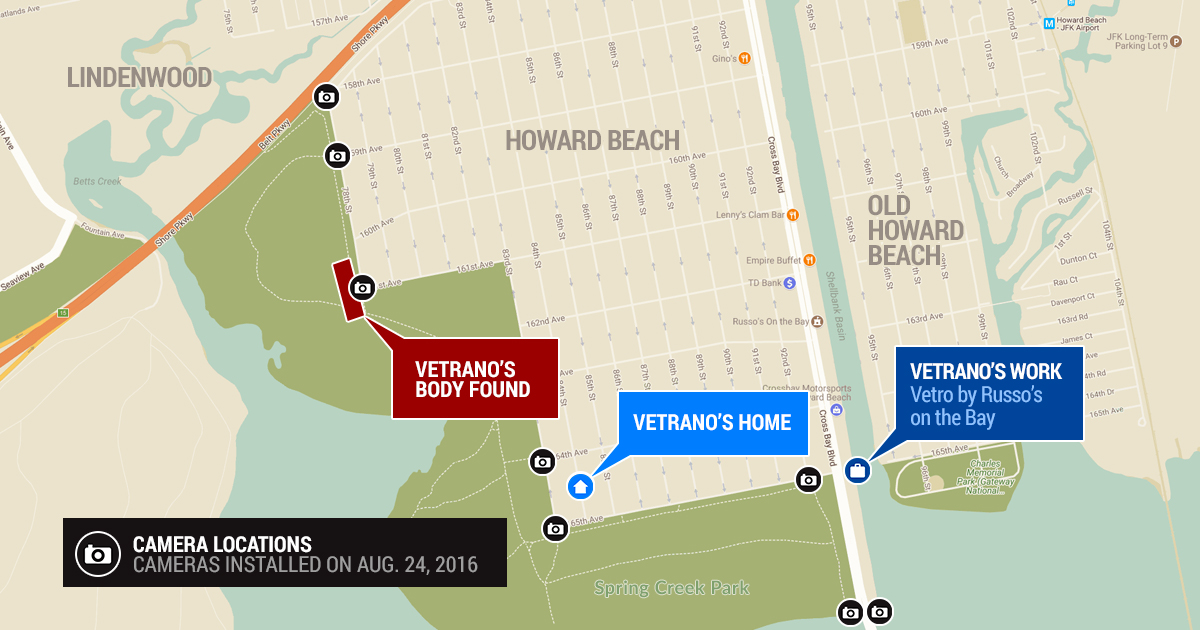 VIEW MAP
VIEW MAP “If you’re going to be walking at night, make sure you go with a buddy,” said Joann Ariola, president of the Howard Beach-Lindenwood Civic Association. “We also urge people not to go to Spring Creek Park. Although it’s patrolled, it’s not as patrolled as we would like it.”
On Feb. 2, just before Lewis’ arrest on Feb. 5, the National Park Service and the state Department of Environmental Conservation approached Queens Community Board 10 – which covers Howard Beach, Ozone Park and South Ozone Park – with an update to its resiliency plan for the park that was proposed in 2015, after superstorm Sandy.
The plan originally focused on reducing storm damage and flooding around Spring Creek Park, but now features a “crime prevention” component, including permanently ripping out the weeds there, replacing them with shorter native plants and installing benches, according to Gateway.
“We wouldn’t want anything to grow high like [the weeds],” explained Gateway spokeswoman Daphne Yun. “It maximizes safety and security through sight lines and access points.”
I would never take my kids in [The Weeds].Howard Beach resident James Debari
… A lot of people don’t go in there.
Construction on the nearly $70 million, FEMA-funded project is expected to start in the summer of 2019 and wrap up by the summer of 2021, according to the DEC.
But infrastructure in the park currently doesn’t support cameras and lighting, Somma said.
Gateway has hired a security expert to figure out whether adding cameras and lighting would be possible, according to Yun.
“Lighting is part of the conversation, but there might not be any lighting so people can know when it’s open and when it’s closed,” Yun said, noting that the park is only open from dawn to dusk. There’s a small sign listing park rules and hours at the intersection of 83rd Street and 161st Avenue.
The community’s concerns over safety in the park came to a head after Vetrano’s death. As the NYPD investigated, the only footage obtained of her running outside the park was captured from a CCTV camera attached to a house on 83rd Street near 164th Avenue.
“If there’s a really safe area, you don’t want the resources to be used, but then something happens, and you wished they were there,” Queens Borough President Melinda Katz said.
The NYPD installed eight cameras along the edge of Spring Creek Park on Aug. 24, 2016, about three weeks after Vetrano was killed. The cameras were funded by Katz’s office as part of a Queens-wide camera installation project costing $1.2 million.
“There always should have been some sort of cameras there,” Katz said. “[Now] if you enter or leave the park, you’ll be filmed.”
“Small-town values”
Howard Beach is mostly residential with a beachside, suburban feel and a population of roughly 30,000 people, 82.4 percent of whom are white non-Hispanic, and the majority of whom are homeowners, according to the most recent U.S. Census data, from 2015. Only about 11 percent of residents rented during 2015, the data shows.
The neighborhood is bound by water on three sides and borders Ozone Park and South Ozone Park to the north and East New York to the west.
John Spinelli, 47, moved to Howard Beach in 2000. The former engineer, who is no longer working and is on disability, said he moved to the area for some peace and quiet and for the Italian community.
“I lived in South Ozone Park, but I moved here because the neighborhood was getting bad — noisy,” Spinelli said. “It’s quiet here. No one plays the music really loud. It’s a nice neighborhood. It’s predominantly Italian. That’s why my mom wanted to live here.”
With a median household income of more than $85,000, Howard Beach is easily the wealthiest of the communities surrounding it. By comparison, the median income of neighboring Ozone Park is $62,057 and in East New York it’s $35,698, census data shows.
Howard Beach also has the lowest major crime numbers out of those neighborhoods.
Complaints about noise and a woman selling ices on the roadside made up the majority of residents’ grievances during a July 12 session of a community meeting, held monthly at the 106th Precinct.
“It’s a community where violent crime is not regular,” said Betty Braton, chairperson of Community Board 10 and a resident of Howard Beach for more than 60 years.
“A murder is far from common. That’s what made it a horrendous thing to the community. It certainly disturbed the community greatly, made people very mindful that there is danger in this world you live in.”
Howard Beach hasn’t seen any murders or rapes in 2017, as of July 23, though there were eight robberies and nine felony assaults. Precinct-wide, there were three murders, four rapes, 109 robberies and 126 felony assaults for that time period.
By comparison, on the other side of the Belt Parkway in the 75th Precinct, which covers East New York and Cypress Hills, there were five murders, 32 rapes, 352 robberies and 478 felony assaults reported for that period.
Single-family houses and manicured lawns make up most of the tight-knit Howard Beach community, with Italian eateries, cafes and chain stores concentrated along Cross Bay Boulevard, the neighborhood’s commercial strip, including Vetro Restaurant and Lounge, where Vetrano worked as a cocktail waitress.
Residents have been more wary since the murder and it’s made them band together, Bohannon said.
“It increased awareness,” he said. “For the family, that grief is never going to go away. As far as the community in general, the businesses doors aren’t shuttered and no one is sleeping behind closed doors. I think we have rebounded pretty well.”
Residents of Howard Beach will hold a vigil for Karina Vetrano on Wednesday, Aug. 2, the one-year anniversary of her death. They will meet at 165th Avenue and 85th Street at 7 p.m. and walk to St. Helen’s Church on 83rd Street. Borough President Melinda Katz and the 106th Precinct’s Commanding Officer Brian J. Bohannon Jr. will be among those in attendance.
Reported by: Heather Holland, Nicole Brown, Lauren Cook, Alison Fox, Alex Bazeley & Sarina Trangle | Copy editor: Martha Guevara | Designer: Matthew Cassella | Interactive editor: Polly Higgins |
Trump and Sessions: How the relationship played out on Twitter

He was one of President Donald Trump’s earliest supporters but now Attorney General Jeff Sessions is taking heat from the president on Twitter. Earlier in the week, Trump expressed regret over choosing Sessions for the Cabinet position and then he took to social media for a days-long public criticism of what he called Sessions’ “weak” handling of allegations against Hillary Clinton.
But the relationship was not always so contentious. Trump has often used Twitter to tout Sessions and his work, before his tone took a sharp turn this week. Here’s a look back at every Sessions-related tweet from Trump’s personal and POTUS handles since the election.
Feb. 28, 2016 Thank you, Senator Sessions
Sessions was the first senator to endorse Trump. In his Facebook post on the endorsement, Trump acknowledged Sessions as “the Senate’s indispensable man and the gold standard.”
Thank you @SenatorSessions!#MakeAmericaGreatAgain #Trump2016https://t.co/Szs0QF88HR pic.twitter.com/UL6t60TTjP
— Donald J. Trump (@realDonaldTrump) February 29, 2016
March 4, 2016 A vote of confidence
Trump chooses Sessions as chairman of a high-profile advisory committee.
Senator Sessions will serve as the Chairman of my National Security Advisory Committee. https://t.co/jQed1P6SD9 pic.twitter.com/n83Cbs4jtA
— Donald J. Trump (@realDonaldTrump) March 4, 2016
June 8, 2016 Foreshadowing retweeted
Back before Trump was even the Republican nominee for president, a supporter tweeted at him with a bright idea: Jeff Sessions for Vice President. Sessions’ name had circulated in the media, as well, as a possible running mate or Cabinet nominee. Trump retweeted the user.
"@KathyCeurter: @realDonaldTrump please Mr.Trump make @SenatorJeffSessions your VP. He is a perfect running mate." He is a great guy!
— Donald J. Trump (@realDonaldTrump) June 9, 2016
Nov 22, 2016 “A fitting selection”
The National Review applauded Trump’s pick for Attorney General. Trump shared the link.
'Jeff Sessions, a Fitting Selection for Attorney General'https://t.co/LjKTkAZSFy
— Donald J. Trump (@realDonaldTrump) November 22, 2016
Jan. 13, 2017 Everyone’s doing great
As confirmation hearings got underway to fill Trump’s Cabinet positions, he tweeted his support.
All of my Cabinet nominee are looking good and doing a great job. I want them to be themselves and express their own thoughts, not mine!
— Donald J. Trump (@realDonaldTrump) January 13, 2017
Jan. 31, 2017 Eager to get Sessions in
When will the Democrats give us our Attorney General and rest of Cabinet! They should be ashamed of themselves! No wonder D.C. doesn't work!
— Donald J. Trump (@realDonaldTrump) January 31, 2017
Feb. 8, 2017 Sessions confirmed
Congratulations to our new Attorney General, @SenatorSessions! pic.twitter.com/e0buP1K83z
— Donald J. Trump (@realDonaldTrump) February 9, 2017
Feb. 9, 2017 Live in the Oval Office
Join us live in the Oval Office for the swearing in of our new Attorney General, @SenatorSessions!
— Donald J. Trump (@realDonaldTrump) February 9, 2017
LIVE: https://t.co/nZ0JJIqmk2 pic.twitter.com/0PEcB2B4Pf
March 3, 2017 ‘An honest man’
After Sessions recused himself from the Russia investigation and any future investigations related to Russia, Trump defended the actions that led Sessions to the decision in a series of tweets. He also told reporters he did not think Sessions needed to recuse himself.
Jeff Sessions is an honest man. He did not say anything wrong. He could have stated his response more accurately, but it was clearly not….
— Donald J. Trump (@realDonaldTrump) March 3, 2017
…intentional. This whole narrative is a way of saving face for Democrats losing an election that everyone thought they were supposed…..
— Donald J. Trump (@realDonaldTrump) March 3, 2017
…to win. The Democrats are overplaying their hand. They lost the election, and now they have lost their grip on reality. The real story…
— Donald J. Trump (@realDonaldTrump) March 3, 2017
…is all of the illegal leaks of classified and other information. It is a total "witch hunt!"
— Donald J. Trump (@realDonaldTrump) March 3, 2017
March 4, 2017
Trump mentioned Sessions in a series of tweets defending him and pointing to the Obama administration’s contact with the Russian ambassador. On the same day, Trump also tweeted the President Barack Obama wire tapped his phones.
The first meeting Jeff Sessions had with the Russian Amb was set up by the Obama Administration under education program for 100 Ambs……
— Donald J. Trump (@realDonaldTrump) March 4, 2017
Just out: The same Russian Ambassador that met Jeff Sessions visited the Obama White House 22 times, and 4 times last year alone.
— Donald J. Trump (@realDonaldTrump) March 4, 2017
March 13, 2017 A proud welcome
Sessions appeared in a series of photos taken in the Oval Office, welcoming the new Cabinet members and meeting with members of a police union.
Proud to welcome our great Cabinet this afternoon for our first meeting. Unfortunately 4 seats were empty because Senate Dems are delaying! pic.twitter.com/mykytxPkD9
— Donald J. Trump (@realDonaldTrump) March 13, 2017
It was an honor to welcome @GLFOP to the @WhiteHouse today with @VP Pence & Attorney General Sessions. THANK YOU for all you do 24/7/365! pic.twitter.com/UOKsiqMpsx
— Donald J. Trump (@realDonaldTrump) March 28, 2017
April 18, 2017 Getting tough
Trump lauds Sessions’ work thus far.
AG Sessions is doing a fantastic job: announced today new steps to dismantle violent gangs like MS-13. I promised to get tough and we are!
— President Trump (@POTUS) April 18, 2017
July 22, 2017 Decrying leaks against the AG
In the early morning hours of July 22, Trump mentioned Sessions in a tweet decrying what he called illegal leaks that lead to a Washington Post report alleging that Sessions had previously undisclosed conversations with Russia about the election.
A new INTELLIGENCE LEAK from the Amazon Washington Post,this time against A.G. Jeff Sessions.These illegal leaks, like Comey's, must stop!
— Donald J. Trump (@realDonaldTrump) July 22, 2017
July 22, 2017 Questions for the AG
About an hour later, the tweets started to point more directly at Sessions.
So many people are asking why isn't the A.G. or Special Council looking at the many Hillary Clinton or Comey crimes. 33,000 e-mails deleted?
— Donald J. Trump (@realDonaldTrump) July 22, 2017
…What about all of the Clinton ties to Russia, including Podesta Company, Uranium deal, Russian Reset, big dollar speeches etc.
— Donald J. Trump (@realDonaldTrump) July 22, 2017
July 24, 2017 Beleaguered
In addition to the criticism of Sessions on Twitter, Trump told The Wall Street Journal he was looking at the possibility of firing him.
So why aren't the Committees and investigators, and of course our beleaguered A.G., looking into Crooked Hillarys crimes & Russia relations?
— Donald J. Trump (@realDonaldTrump) July 24, 2017
July 25, 2017 VERY weak
Attorney General Jeff Sessions has taken a VERY weak position on Hillary Clinton crimes (where are E-mails & DNC server) & Intel leakers!
— Donald J. Trump (@realDonaldTrump) July 25, 2017
July 26, 2017 Foreshadowing retweeted
Trump’s attack continued, even as Republicans came to Sessions’ defense and denounced the president’s actions.
Why didn't A.G. Sessions replace Acting FBI Director Andrew McCabe, a Comey friend who was in charge of Clinton investigation but got….
— Donald J. Trump (@realDonaldTrump) July 26, 2017
…big dollars ($700,000) for his wife's political run from Hillary Clinton and her representatives. Drain the Swamp!
— Donald J. Trump (@realDonaldTrump) July 26, 2017
In the following days, Trump said in interviews that he wants Sessions to stay on the job. Sessions said he intends to do so.
What’s going on with the Russian estate on Long Island?
A nearly century-old mansion on Long Island’s North Shore is still the focus of a diplomatic dispute between the United States and Russia that has lingered from shortly before President Donald Trump took office.
The United States barred Russian diplomats from the Nassau estate in retaliation for Russia’s alleged interference in the U.S. presidential election and harassment of U.S. diplomats in Russia, charges that the Russian government has denied.
However, for some Long Islanders this throwback to the Cold War is more about lost dogs, holidays gifts and armed guards than international intrigue.
How did we get here?
The 18,929-square-foot Russian-owned mansion and 14-acre property on Mill River Road in Upper Brookville, described by the U.S. government as a “recreational compound,” was ordered closed by President Barack Obama’s administration on Dec. 29, 2016. The next day, 35 diplomats were expelled from the premises.
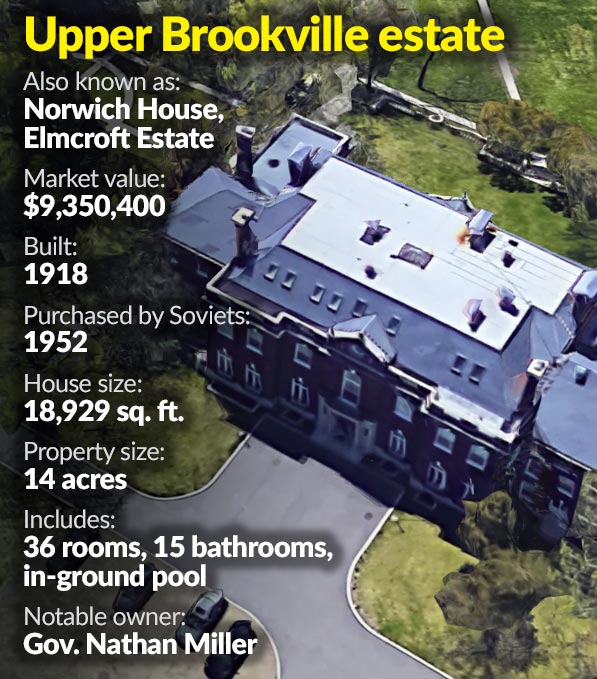
(Credit: Google Maps)
Russia has repeatedly condemned the compound’s closure, charging that it is a violation of international diplomatic agreements. And Cold War experts have said they could not recall another example of a decision to bar diplomats from entering Soviet- or Russian-owned property, according to a McClatchy report.
Russian officials on July 28 ordered the closure of a U.S. recreational retreat and warehouse in Russia, a move described in news reports as in part retaliatory. Russia also ordered the United States to cut its embassy and consular staff in Russia by 755, in retaliation for Congress approving new U.S. sanctions against Russia, which Trump signed into law days later.
Upper Brookville estate closure timeline
 Dec. 30, 2016
Dec. 30, 2016
Russian diplomats vacate the compound on Mill River Road in Upper Brookville after it was ordered closed by President Barack Obama.
Credit: Howard Schnapp
 July 7-8, 2017
July 7-8, 2017
President Donald Trump and Russian leader Vladimir Putin discuss the mansion at the G-20 summit in Hamburg, Germany. Credit: AP
 July 28, 2017
July 28, 2017
Putin orders the United States to cut its diplomatic staff in Russia by 755 in retaliation for Congress approving new sanctions. Credit: AP
 Aug. 2, 2017
Aug. 2, 2017
Trump signs the bipartisan Russia sanctions bill, but calls it “seriously flawed,” drawing the ire of Democrats, including Senate Minority Leader Chuck Schumer. Credit: AP
Seemingly decent but distant neighbors
Liz Berens, 69, of Upper Brookville, has closer ties to the mansion than a typical Long Islander. She is the granddaughter of former New York Gov. Nathan Miller, the estate’s previous owner. In 1952, Miller sold the property to the Russians, according to Newsday reporting.
The house, also known as the Elmcroft Estate and Norwich House, had become “very proletarian,” she said, comparing it to her memories of visiting the property as a child, and her last visit from about 15 years ago.
“All of the beautiful details were gone. It was very sparse,” Berens said.
Shortly after her last visit, she said the FBI interviewed her and showed her a blueprint of the house, asking her to note each room she saw and to describe it. An FBI spokeswoman said the bureau had no comment.
Berens said the Russians were “decent neighbors,” but when the closure was announced, she “wasn’t surprised that there were perhaps intelligence operations going on there.”

Norwich House seen in an undated photo. (Credit: Courtesy of Liz Berens)
Dan Travers, 56, who has lived across from the compound for more than 12 years, said he never noticed any “unusual activities” on the property.
Travers said his only encounter with someone from the Russian compound came about two years earlier after his dog walked across the street and spent the night against the property’s fence.
“Someone called us who didn’t speak English” and managed to communicate that the dog was there, Travers said.
Alexa Roland, 23, who lives less than a quarter mile from the compound, said that when she was about 10 years old, her mother, out of curiosity, drove up the driveway, which at the time had no gate.
“Two men came out and they were armed,” Roland recalled. “They asked what we were doing and said, ‘We’ll have to search you. This is Russian property.’ ” The men searched the car, Roland and her mother, and then told them to immediately leave, she said.
Nick DeMartino, who said he had lived several houses away for five years, said he used to hear people at the estate firing shotguns at clay pigeons on the weekends.
“We knew they were Russian diplomats,” he said in a Reuters report. “We’d seen them driving around town.”
Penny Hallman, another neighbor, said that in the days before the Russians were removed, a man whom she knew only by the title of “senior counselor” stopped by her home with a holiday gift of vodka and candy.
“I hope they come back,” Hallman told The New York Times. “It’s been a pleasure to have them here.”
How has local government reacted?
Upper Brookville Mayor Elliot Conway said he had contact with the State Department, which has maintained the estate since it was ordered shut, and “they confirmed there’s no change” in its status.
“I think the [Russian] mission is a small pawn in a very large and complicated chess game,” Conway added.
Photos: Russian-owned mansion in Upper Brookville closes
In June, Oyster Bay Town officials started charging beach parking and permit fees for members of the Russian mission to the UN. The fees had been waived for decades as a gesture of goodwill.
But officials say the change has nothing to do with international politics, just fairness. Town Supervisor Joseph Saladino said the practice was unfair to residents who pay for the $60 annual permit. He said anyone who is a resident of the Upper Brookville house could buy the permit.
Do the Russians own anything else on Long Island?
In addition to the Elmcroft Estate, the Soviet Union bought the Killenworth mansion on Dosoris Lane in nearby Glen Cove in 1946, according to a Newsday story from that year. The 26,459-square-foot house was built in 1912 by philanthropist and Standard Oil heir George Dupont Pratt. The property hasn’t been part of sanctions during the diplomatic tiff.
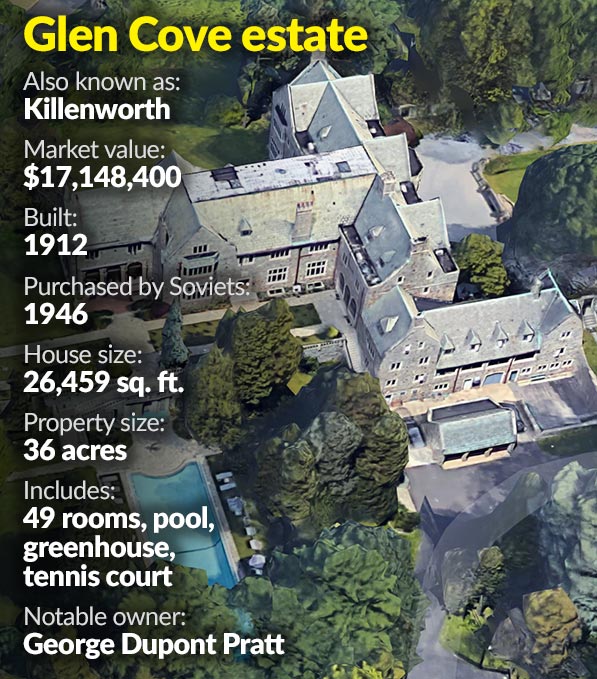
(Credit: Google Maps)
A number of early news reports incorrectly stated the Glen Cove property — not the Upper Brookville mansion — was the Long Island estate that the Obama administration had targeted.
Orin Finkle, 76, of Great Neck, is a historian of Long Island Gold Coast estates. Having acquired many historical photos of such houses, Finkle used his collection to secure a visit to the Glen Cove mansion in 1985.
“I called the UN and said, ‘I know no Americans ever go in that house,’ ” he said. “ ‘I’ll make you a trade: I’ll give you the photos if you let me in.’ ”
The Glen Cove and Upper Brookville properties are outlined in red in the map above. Click on each one for more information.
About one month later, Finkle said he was invited. He walked through, escorted by a United Nations diplomat and two of the Soviets who were staying in the house at the time. They showed him around and discussed the differences between American and Soviet lifestyles.
“It was very pleasant. They were very nice,” he said.
Finkle said they wouldn’t take him upstairs, only showing him the first floor. He recalled “nothing fancy” in the house itself, but said the outside was as “beautiful” as he had seen in older photos.
“Everything looked how it looked back in the old days,” he said. “If I didn’t know that was the Russians, anyone could’ve been living there at the time.”
Photos: Russian-owned estate in Glen Cove through the years
Liam Cox, 19, recalled that when he was a child at a summer camp located on property next to the mansion, counselors would jokingly say, “ ‘Don’t cross over the fence or you’ll get shot.’ ”
The Glen Cove resident said he doesn’t mind the Russian government’s presence in the city.
“I’ve lived here my whole life and it hasn’t bothered me,” he said. “It’s not like anything is going on there.”
Gloria Farino, 87, of Fort Salonga, who was in Glen Cove one afternoon for an eye doctor’s appointment, feels the same way.
“If it has never caused problems before, why would it cause problems now?” she said.
Spying allegations, Khrushchev and Castro
The Soviets installed electronic surveillance equipment at Killenworth to spy on the Long Island defense industry and high-tech firms, a Soviet defector and a U.S. official told Newsday in 1982.
The allegations of spying led Glen Cove Mayor Alan Parente to bar Soviet officials from using city beaches and tennis courts, according to news reports at the time. The Glen Cove City Council lifted the ban in 1984 by a vote of 5-2. The two dissenting voters, Tip Henderson and Ann Gold, said the Soviets should have to pay taxes to use the city’s recreational facilities. They had not done so because the house was under tax-exempt status as a diplomatic consulate.
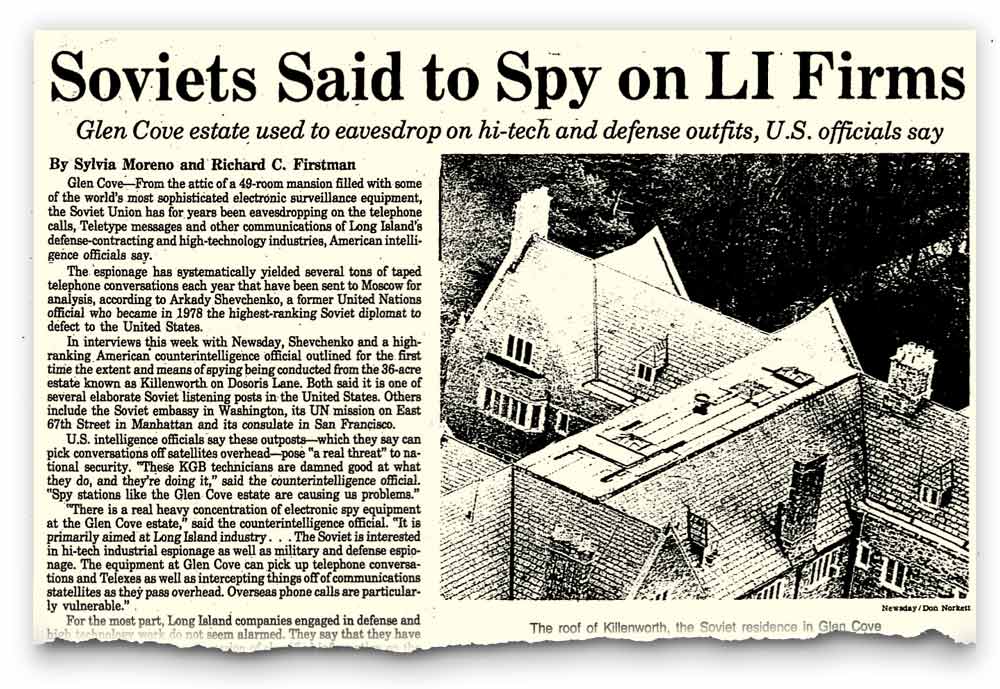
An April 28, 1982, Newsday article about alleged spy activity conducted at the Glen Cove estate.
Reginald Spinello, the former Glen Cove mayor, recalled that when he was a child in 1960 during a time of tense relations between the Soviet Union and the United States, Soviet leader Nikita Khrushchev visited the estate.
“People lined the streets,” he said. “They were throwing tomatoes at the limos. People were not happy at the time that he was coming in there.”
The Soviets also once hosted Fidel Castro at the mansion, McClatchy reported.
Could the Trump administration let the Russians back in the Upper Brookville compound?
Only if Congress agrees. The new sanctions, which Trump reluctantly signed into law on Aug. 2 after they overwhelmingly passed the House and the Senate, require congressional review of any administration plan to return the property, news reports say. It’s unclear what will happen to the estate if the Russians are not allowed to return.
Top image credit: News 12 Long Island
Design: Matthew Cassella Map: Tim Healy Illustration: Seth Mates Copy editor: Jennifer Martin Research: Laura Mann, Judy Weinberg Production: Joe Diglio
Viewing the solar eclipse on Long Island: What you need to know
If you’re wondering about the recent barrage of images of people in dark glasses gazing up at the sky, you’ll want to learn a thing or two about the celestial phenomenon coming up during the daylight hours of Monday, Aug. 21.
It’s a total eclipse of the sun, viewable over parts of the U.S. – but for Long Island the eclipse will be partial, covering only about 71 percent of the sun.
You can follow along here for live updates from social media users on Long Island and across the country.
When is it?
Aug. 21 at 1:24 p.m.: The eclipse starts on Long Island and eclipse eyewear must be worn.
2:46 p.m.: Maximum coverage of sun, around 71 percent, will occur.
4:01 p.m.: The eclipse ends on Long Island.
What is it?
A narrow strip of darkness about 70 miles wide moves speedily across the country, starting in Oregon and, about 90 minutes later, exiting the U.S. from South Carolina.
The sun, moon and earth will be lining up. As the moon gradually moves in front of the sun, it blocks the sun’s light and its shadow is cast onto the Earth, making it feel like nighttime is falling.
Long Island, which is not on that narrow path of total eclipse, will see a partial eclipse of the sun, weather permitting.
What a total eclipse will look like:
In areas where skywatchers can see a total eclipse, here’s how it will go:
The moon starts moving over the sun, and gradually the sun is completely blocked, lasting in many locations a little over two minutes.
The sun’s corona, which is made up of strands of gases from the sun’s outer atmosphere, is visible, emanating from around the darkened orb. Then the moon starts moving away, gradually revealing the sun.
What the eclipse will look like on Long Island:
The moon starts moving over the sun, and gradually, about 71 percent of the sun is covered. The moon then starts moving away, gradually revealing the rest of the sun.
Protect your eyes
First, if you value your eyeballs, you’ll view through special eclipse glasses – not sunglasses or filters.
For the partial eclipse on Long Island, the glasses must be worn from beginning to end, or eyes will be damaged by the sun’s rays. Glasses should be marked with safety standard number ISO 12312-2. Beware that some glasses that were sold online are not compliant.
A list of reputable vendors is available on the American Astronomical Society website.
Where to watch outside:
If you want to watch the eclipse somewhere other than the beach or your back yard, here’s a sampling of locations where Long Islanders can gather during the early afternoon on August 21.
Some locations will provide safe viewing options, such as eclipse glasses, and some are weather permitting. Check the links for more details:
South Fork Natural History Museum and Nature Center
377 Bridgehampton/Sag Harbor Turnpike, Bridgehampton
201 Main St, Sag Harbor
Event is at Schoolhouse Green, Foxhurst Road, Oceanside.
Charles Lindbergh Blvd., Garden City
1886 Front Street, East Meadow
Where to watch inside:
Video credit: NASA
Some sites will be live-streaming the eclipse:
If you miss this solar eclipse:
Mark your calendar for April 8, 2024, when the path of totality crosses upstate New York.
Senate health care vote: What went wrong
Republicans suffered a stunning defeat early Friday morning, when the Senate narrowly rejected the GOP’s slimmed-down Obamacare repeal bill after an ailing Sen. John McCain — whose support allowed the debate to begin Tuesday — cast a surprise “no” vote.
The vote dealt a serious blow to President Donald Trump and the GOP agenda, with most Republican candidates having pledged for years to repeal President Barack Obama’s 2010 health care overhaul, the Affordable Care Act.
Here’s what led up to the vote’s failure:
Pence breaks procedural vote tie
The Senate held a procedural vote on Tuesday that allowed formal debate to begin on a potential repeal of major components of the Affordable Care Act. The vote itself did not trigger any changes to the existing legislation. Nonetheless, it was seen as an indication of how some Republican senators on the fence about the actual repeal effort may ultimately vote. The vote passed by a slim margin with Vice President Mike Pence breaking a 50-50 tie.
The two Republicans, Susan Collins of Maine and Lisa Murkowski of Maine, to cast “no” votes had already put their opposition on record. That left moderate GOP senators such as Dean Heller of Nevada and John McCain of Arizona, as the critical votes. Heller didn’t indicate his support until minutes before the vote while McCain – making a dramatic return to the Senate after a recent diagnosis of brain cancer – gave no indication of which way he was leaning until he cast a “yes” vote. All Democrats voted no as expected.
Repeal and replace bill fails
The first defeat for Republicans in the week’s 20-hour period of debate and amendments to dismantle Obamacare came late Tuesday, when nine Republican senators defected and sank Senate Majority Leader Mitch McConnell’s repeal and replace Obamacare bill.
The bill was a wide-ranging proposal that would repeal much of former President Barack Obama’s health care law and replace it with a more restrictive plan.
The rejected proposal included language by McConnell erasing the Obama law’s tax penalties on people not buying insurance and cutting Medicaid.
Language by Texas Republican Sen. Ted Cruz would let insurers sell cut-rate policies with skimpy coverage. And there was an additional $100 billion to help states ease costs for people losing Medicaid sought by Midwestern moderates.
Full Obamacare repeal vote fails
On Wednesday, July 26, the divided Senate Republican majority failed to muster the votes to pass its longtime goal of a complete repeal of Obamacare, marking the second setback of the week as it debated and attempted to shape legislation to dismantle the 2010 health care law.
The amendment, which resurrected a 2015 bill to repeal Obamacare but delay it for two years to give lawmakers time to replace it, failed in a 45-55 vote, with seven Republicans — including McCain — voting against it, even though six of them voted for it when it passed in 2015.
Republicans voting no were McCain, Murkowski, Sen. Rob Portman of Ohio, Sen. Shelley Moore Capito of West Virginia, Sen. Dean Heller of Nevada, Sen. Susan Collins of Maine and Alexander, and Sen. Lamar Alexander of Tennessee.
‘Skinny repeal’ bill fails
The “skinny repeal” bill would have ended the mandate that all individuals obtain health insurance, terminated a tax on medical devices, and leave untouched a Medicaid expansion created by Obamacare. It would have resulted in the loss of health insurance for 15 million people over the next decade and a 20 percent increase in insurance premiums, the nonpartisan Congressional Budget Office estimated.
McCain, whose return to the Senate helped begin the formal debate on the three health-care bills, ultimately cast the vote that killed the Republicans’ “skinny repeal” bill and delivered a severe political defeat for Trump and McConnell.
Skinny repeal fell short because it fell short of our promise to repeal & replace Obamacare w/ meaningful reform https://t.co/tZISIvccOO
— John McCain (@SenJohnMcCain) July 28, 2017
McCain made the call shortly after dramatically walking to the front of the Senate floor around 1:30 a.m. Friday, holding out his arm and turning his thumb down — meaning a 51-49 defeat for the bill Republicans called the Health Care Freedom Act. The Arizona maverick joined with fellow Republicans Collins and Murkowski and all 48 Democrats in the chamber to vote no.
I urge my colleagues to trust each other, stop political games& put health needs of American ppl 1st. We can do this https://t.co/3gKeGcHNQH
— John McCain (@SenJohnMcCain) July 28, 2017
The amendment was a last resort for Senate Republicans to pass something — anything — to trigger negotiations with the House. Some Republicans were concerned that the House would simply pass the pared-down bill and send it to Trump.
The reaction
House leaders had no hesitation about blaming the Senate for the collapse of one of the GOP’s paramount priorities.
In a statement, Speaker Paul Ryan, R-Wis., pointedly said “the House delivered a bill” and said he was “disappointed and frustrated.” Nearly three months earlier, the House approved its health care package after several embarrassing setbacks.
He added, “But we should not give up. I encourage the Senate to continue working toward a real solution that keeps our promise.”
3 Republicans and 48 Democrats let the American people down. As I said from the beginning, let ObamaCare implode, then deal. Watch!
— Donald J. Trump (@realDonaldTrump) July 28, 2017
Trump returned to Twitter to express his disappointment with the failure of the GOP effort and threatened to let the health care system collapse:
Long Island unemployment rates for June 2017
The overall unemployment rate on Long Island for June 2017 rose to 4.2 percent, up 0.2 percentage points from where it was a year earlier, according to data from the state’s Department of Labor. The Village of Freeport showed the largest percentage-point increase, rising to 5 percent from 4.5 percent in June 2016. The Town of Huntington rose 0.4 percentage points, up to a rate of 4.0. The charts show June rates for 2017 and 2016 and the table below gives details. Read more.
Local jobless rates for June
Details on the monthly unemployment rates
| June 2017 | Labor Force | Employed | Unemployed | Rate (%) |
|---|---|---|---|---|
| Nassau-Suffolk | 1,511,900 | 1,448,500 | 63,500 | 4.2 |
| Nassau County | 716,800 | 687,300 | 29,500 | 4.1 |
| Freeport Village | 23,200 | 22,100 | 1,200 | 5.0 |
| Glen Cove City | 14,300 | 13,800 | 500 | 3.8 |
| Hempstead Town | 408,700 | 391,100 | 17,600 | 4.3 |
| Hempstead Village | 28,200 | 26,700 | 1,500 | 5.2 |
| Long Beach City | 20,000 | 19,300 | 800 | 3.8 |
| North Hempstead Town | 115,500 | 111,100 | 4,400 | 3.8 |
| Oyster Bay Town | 158,200 | 152,000 | 6,200 | 3.9 |
| Rockville Centre Village | 12,400 | 11,900 | 500 | 3.9 |
| Valley Stream Village | 20,200 | 19,300 | 900 | 4.4 |
| Suffolk County | 795,100 | 761,200 | 33,900 | 4.3 |
| Babylon Town | 114,500 | 109,000 | 5,400 | 4.7 |
| Brookhaven Town | 260,100 | 248,600 | 11,400 | 4.4 |
| Huntington Town | 106,800 | 102,600 | 4,200 | 4.0 |
| Islip Town | 182,800 | 175,000 | 7,800 | 4.3 |
| Lindenhurst Village | 15,700 | 15,000 | 700 | 4.7 |
| Riverhead Town | 16,300 | 15,600 | 700 | 4.1 |
| Smithtown Town | 61,400 | 59,000 | 2,400 | 3.9 |
| Southampton Town | 29,500 | 28,400 | 1,100 | 3.7 |
| New York City | 4,220,700 | 4,034,900 | 185,700 | 4.4 |
| New York State | 9,739,700 | 9,298,700 | 441,000 | 4.5 |
| May 2017 | Labor Force | Employed | Unemployed | Rate (%) |
| Nassau-Suffolk | 1,477,500 | 1,420,300 | 57,300 | 3.9 |
| Nassau County | 700,500 | 674,100 | 26,400 | 3.8 |
| Freeport Village | 22,700 | 21,600 | 1,000 | 4.6 |
| Glen Cove City | 14,000 | 13,500 | 500 | 3.6 |
| Hempstead Town | 399,200 | 383,600 | 15,600 | 3.9 |
| Hempstead Village | 27,400 | 26,200 | 1,300 | 4.6 |
| Long Beach City | 19,600 | 18,900 | 700 | 3.6 |
| North Hempstead Town | 112,900 | 109,000 | 3,900 | 3.5 |
| Oyster Bay Town | 154,700 | 149,100 | 5,600 | 3.6 |
| Rockville Centre Village | 12,100 | 11,700 | 400 | 3.5 |
| Valley Stream Village | 19,700 | 18,900 | 800 | 4.1 |
| Suffolk County | 777,100 | 746,200 | 30,900 | 4.0 |
| Babylon Town | 111,800 | 106,900 | 4,900 | 4.4 |
| Brookhaven Town | 253,800 | 243,700 | 10,000 | 3.9 |
| Huntington Town | 104,400 | 100,500 | 3,900 | 3.7 |
| Islip Town | 178,700 | 171,500 | 7,200 | 4.0 |
| Lindenhurst Village | 15,400 | 14,700 | 700 | 4.5 |
| Riverhead Town | 16,000 | 15,300 | 700 | 4.1 |
| Smithtown Town | 60,000 | 57,800 | 2,100 | 3.6 |
| Southampton Town | 28,900 | 27,800 | 1,100 | 3.8 |
| New York City | 4,201,700 | 4,023,700 | 178,000 | 4.2 |
| New York State | 9,614,900 | 9,204,700 | 410,200 | 4.3 |
| June 2016 | Labor Force | Employed | Unemployed | Rate (%) |
| Nassau-Suffolk | 1,501,700 | 1,442,200 | 59,500 | 4.0 |
| Nassau County | 711,300 | 684,200 | 27,100 | 3.8 |
| Freeport Village | 23,000 | 22,000 | 1,000 | 4.5 |
| Glen Cove City | 14,300 | 13,700 | 500 | 3.6 |
| Hempstead Town | 405,400 | 389,300 | 16,100 | 4.0 |
| Hempstead Village | 27,900 | 26,600 | 1,400 | 4.9 |
| Long Beach City | 19,900 | 19,200 | 700 | 3.5 |
| North Hempstead Town | 114,700 | 110,600 | 4,100 | 3.6 |
| Oyster Bay Town | 157,100 | 151,400 | 5,700 | 3.6 |
| Rockville Centre Village | 12,300 | 11,800 | 500 | 3.9 |
| Valley Stream Village | 20,000 | 19,200 | 800 | 4.1 |
| Suffolk County | 790,400 | 757,900 | 32,400 | 4.1 |
| Babylon Town | 113,800 | 108,600 | 5,200 | 4.6 |
| Brookhaven Town | 258,500 | 247,600 | 10,900 | 4.2 |
| Huntington Town | 106,000 | 102,100 | 3,800 | 3.6 |
| Islip Town | 181,900 | 174,200 | 7,600 | 4.2 |
| Lindenhurst Village | 15,600 | 14,900 | 700 | 4.4 |
| Riverhead Town | 16,200 | 15,600 | 600 | 3.9 |
| Smithtown Town | 61,000 | 58,800 | 2,200 | 3.7 |
| Southampton Town | 29,400 | 28,300 | 1,100 | 3.8 |
| New York City | 4,127,700 | 3,913,500 | 214,200 | 5.2 |
| New York State | 9,644,700 | 9,189,200 | 455,400 | 4.7 |
360 View: Walk the historic staircases of Sea Cliff
360 View: Walk the historic staircases of Sea Cliff
Watch as Sea Cliff administrator Bruce Kennedy tours the village’s historic staircases that lead to the beach.
Sea Cliff administrator Bruce Kennedy tours the village’s historic staircases that lead to the beach on Friday, July 21, 2017. Some staircases are under construction, part of a multiyear project to restore and rebuild the structures. (Credit: Newsday / Raychel Brightman, Danielle Siegel)
Note: On mobile devices, the 360-degree video experience can be viewed only in the YouTube app.

